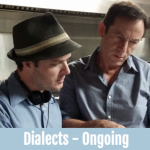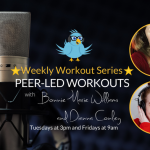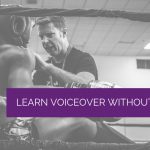Best Vocal Warm-Ups for Voice Actors
By: Al Black
From: Voquent
Vocal warm-up exercises are a critical component of every top voice actors daily regime.
So why then is there so much misinformation floating around the web about what it takes to look after your voice? Many frequently shared ‘tips’ are the equivalent of old wives’ tales and some could even damage your vocal health over the long term!
To ensure the Voquent community are equipped with the best advice possible, we sat down with the amazing and talented vocal coach Nic Redman to learn more about the best vocal warm-up exercises, what vocal health advice to avoid and what additional reading and training you should do. Let’s dive right in!
Q: Tell us about your voice coach and accent business. What does it do and what value do you add?
Nic: I am a voice coach and accent specialist helping people use their voices in a multitude of different ways in their profession.
I offer a fresh, approachable perspective to voice training, which often has a bit of a reputation for being abstract or unobtainable for some people. As well as working with those at the top of their acting or presenting career on vocal techniques helping them to understand and develop their voice, produce new accents or improve their mic technique, I also support business professionals to find confidence and presence in public speaking, encouraging them to gain a more charismatic delivery or find who they are vocally in that space.
A lot of my clients are in VO, narration, podcasting, comedy and corporate sectors and they don’t have the luxury or desire to do long, progressive, explorative voice work all the time. Sometimes they need results really quickly. I offer tips & tricks to show people that you can use voice work to help your voice pretty instantly as well as offering the longer, more indulgent exploration work. Really my work is about demystifying the voice training process and I set out to reveal how little simple things can make a huge difference to our voices.
I’m really lucky to have quite a unique blend of experience as a working voice over artist for 15 years and being an MA qualified voice and accent coach (Royal Central School of Speech and Drama) which included training with some of the icons of the voice training world; Cicely Berry, Kristen Linklater, Barbara Houseman, Edda Sharpe & Jan Haydn Rowles to name a few people might recognise from the books out there!So not only do I know how the voice works intricately, how to train it and help people get the most out of it but I’m using my voice every day so I understand the importance of it for people as their source of income. I know how high the stakes can be!
Q: Who will benefit from vocal coaching?
Nic: Clients tend to come with an idea of what they think is wrong so the first job is to get to the root of what might be the real problem. With voice actors, it tends to be breath or vocal fatigue the most, which are usually linked in some way anyway. If the breath isn’t working efficiently then the voice can get tired more quickly and that’s no good if you’ve got 6 hours of audiobook narration to do every day! Physical alignment is generally the cause of breath issues and fatigue so I do a lot of work on simple awareness of what the body is doing and where tensions are being held that may be compensating for alignment issues. Adjusting the body and releasing these unnecessary tensions offers people a huge amount of freedom.
I find the simplest things are so helpful in voice-over as many folks haven’t had voice training before or are working with the stuff they were told a million years ago by a singing teacher or at drama school. I do a lot of warm-up tweaking and introducing people to the concept of a vocal cool down!
Q: Why are vocal warm-ups so important?
Nic: A warm-up is about preparing the voice for the work and making your life easier. It shouldn’t be a long session; 10-15 minutes is enough. We want the body, breath and voice to be free to respond to whatever the needs of the communication are. It’s very similar to preparing the body for sports. You don’t just run a marathon. You do a few stretches first! Your voice needs the same. A warm-up is about allowing you to get more from your voice for less effort and increasing your vocal stamina. Who wouldn’t want that?
Q: What bad recommendations or advice do you hear about vocal health?
Nic: To be honest, a lot of advice given in answer to generic questions in, say Facebook groups, although well-meaning, can be counterproductive. Vocal health is so bespoke to the person that someone explaining why their voice used to get tired a lot is probably not going to be any use to the person asking the question. You’ve got to be so careful out there with the advice you take as everyone is an expert on the internet. I do, by the way, appreciate the irony in the fact that people are reading my advice on the internet right now! But as a qualified Vocal Health First Aider, I am offering the most up to date insight as possible, promise. A few things to discount if you see them around are:
1. That certain things you eat, drink or suck ‘coat’ the vocal folds.
They don’t. Nothing you imbibe touches the vocal folds on the way down as it’s a different pipe. The only way to affect the mucosal layer on the VFs is to hydrate the whole body systemically with fluids. Or the newest craze, nebulising an isotonic saline solution, to hydrate superficially on the VFs from the outside in.
2. Recommendations for lotions and potions containing all kinds of archaic concoctions of things that people profess to not be able to voice without.
It often comes in the form of lozenges, teas and throat gargles, many of which the recipes were created about 100 years ago. Some lozenges can more harm than good; anything with menthol in, for example, will dehydrate the vocal folds. And shipping throat gargles in from overseas in bulk is not needed if you look after your body and voice properly. You just need to drink fluids.
3. Specific medical diagnosis offerings concern me.
They can worry people unnecessarily. But you also don’t want to be self-diagnosing something in yourself. Your body is your body. If you’re having a recurring vocal health issue, see your medical professional. Don’t consult social media.
Q: What are the different stages of vocal warm-up exercises?
Nic: I think it’s important to draw a distinction between a vocal ‘warm-up’ and a vocal ‘work out’.
A ‘workout’ is when you have a specific element or technique that needs attention with committed practice for a longer period over a number of days, weeks, months. This can be an articulation feature, breath work or any other number of things. A vocal ‘warm-up’, as mentioned earlier, is about readying you for the work. So it should be a collection of exercises that cover the following areas.
Body work/physical release – excess tension in the body will impact vocal freedom so it’s important to get the muscles warmed up and released firstly.
Breath – breath is the fuel for the voice so we need to release it and get it energised and working efficiently
Resonance/vocal quality – this is the tone of the voice and we have so much potential for range and colour. A warm-up should explore as much of your range as you can so you’ve got access to lots of different vocal qualities.
Articulation/clarity – this is the forming of the words themselves. We need to release and energise the articulators (lips, tongue, soft palate, jaw) so that our mouths can form the words we need with ease.
Text – A little work with text is great at the end of a warm-up as it allows you to see how your voice has changed. Awareness is key. I like to read a piece of text before I start and then another at the end and compare how my voice feels. It can be really enlightening!
If you’ve got a few things in those areas you’ll be good to go!
Q: What are the best vocal warm-up exercises for voice actors?
Nic: Firstly, check your alignment on the mic, this is the easiest way to keep you voice working well for longer. I’ve got a video about this here.
Exercise 1 – Spine rolls!
These get the body energised, the spine and ribs open which you need for freedom of the breath and they’re also great for grounding and connection to the floor which gives the body stability and therefore more potential for release of excess tension in the body.
Exercise 2 – Neck stretches
Neck stretches are really key for VOs when warming up. It’s very easy to get tense in the neck when you’re aiming all your energy into the mic. Try these.
Exercise 3 – SOVT exercise
SOVT stands for Semi-occluded vocal tract exercises which basically means partially obstructing the airflow. The most common out there is the lip trill or lip bubble. SOVT exercises help you get the vocal folds vibrating efficiently and encourage a consistent airflow with minimal effort which is what we want for voicing so they’re a great exercise to have in your toolkit.
Exercise 4 – Focusing on the out-breath
Much of the emphasis in voicing is placed on the in-breath but by focusing on the out-breath, and letting the in-breath happen for us, we can find a much more supported out-breath and reduce those pesky noisy and snatched in-breaths.
Exercise 5 – Tongue release work
Tongue release work is hugely beneficial for voice technique so try this little stretch before you get stuck into speaking.
Exercise 6 – Tongue twisters
Tongue twisters are great for energising the articulators and can be tailored to whatever sounds you find most tricky. Here is a great one for working on the plosives that often cause issues on the mic.
Q: When is the best time to practice vocal warm-up exercises?
Nic: You can do vocal warm-ups at any stage as it’s always beneficial to give your vocal mechanism some attention but you’ll get the most out of it if you do it just before you record.
Q: How often should you exercise your voice and how soon can one expect to feel the benefits?
Nic: Some of the fundamental elements of voice work, like alignment, breath, resonance and articulation, take time. If you’ve been using your voice in a particular way for a long time it’ll take committed and deliberate practice to imbed new more efficient physical and mental habits. One of the frustrating things I deal with is that most people come to me when the problem is already there. A lot of my work is a cure rather than prevention. There’s a lot of benefits in exploring voice training with an experienced coach even if you feel like you don’t need it as there are always things you can improve on. I still train myself, the journey in voice work neer stops!
Q: What else do you recommend voice actors do to maintain optimum vocal health?
Nic: Stay hydrated, sleep and do physical practices that encourage the release of tension and awareness of the breath like yoga.
Q: In the last five years, what new belief, behaviour, or habit has most improved your life?
Nic: Awareness. It’s the first step to improving anything, voice or otherwise. I’ve found raising my awareness about my body and breath incredibly powerful for my vocal technique. It means my voice warm-ups or workouts are specific to what I need at the moment making them efficient and much more useful than just churning out the same things each day. Notice how things affect you, warm up with mindfulness rather than going through the motions. You mustn’t take for granted that what works for you one day will work the next. You’ll get a lot more out of your practice.
Q: Lastly. What books have greatly influenced your life?
Nic: Oh lord this list could be huge! I’ll keep it to a voice books
- Breath by Jame Nestor: a hugely important book for anyone with an interested in improving their voice as well as their physical and mental health
- Voice work, Art & Science in Changing Voices by Christia Shewell: is the bible for any voice practitioner
- Your Voice & How To Use It by Cicely Berry: a timeless classic and hugely interesting read for anyone interested in their voice.
Nic is happy to answer your burning questions via her Instagram account @NicRedVoice – thanks Nic!
Get more training tips at The Voice & Accent Hub Facebook group.








